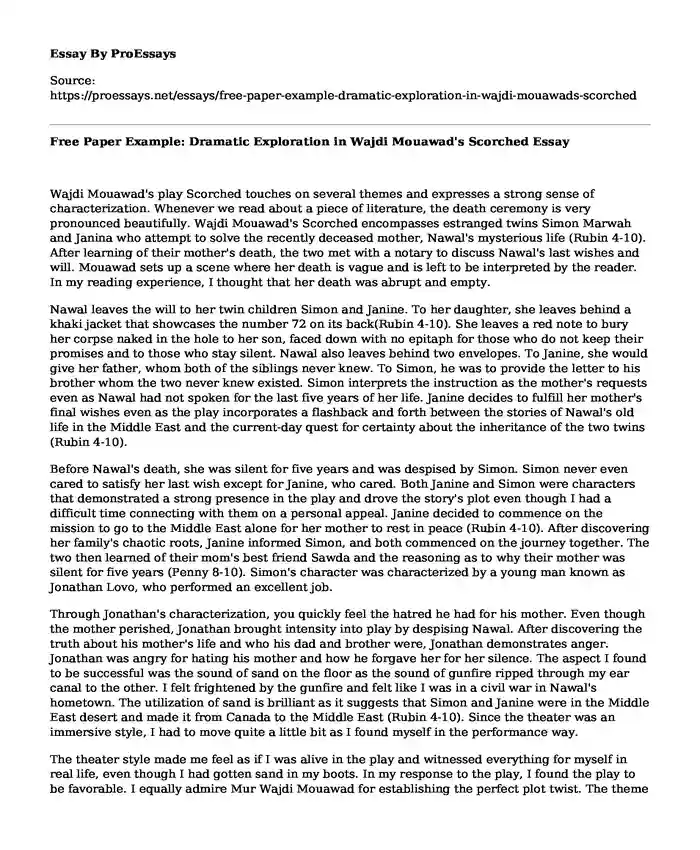Wajdi Mouawad's play Scorched touches on several themes and expresses a strong sense of characterization. Whenever we read about a piece of literature, the death ceremony is very pronounced beautifully. Wajdi Mouawad's Scorched encompasses estranged twins Simon Marwah and Janina who attempt to solve the recently deceased mother, Nawal's mysterious life (Rubin 4-10). After learning of their mother's death, the two met with a notary to discuss Nawal's last wishes and will. Mouawad sets up a scene where her death is vague and is left to be interpreted by the reader. In my reading experience, I thought that her death was abrupt and empty.
Nawal leaves the will to her twin children Simon and Janine. To her daughter, she leaves behind a khaki jacket that showcases the number 72 on its back(Rubin 4-10). She leaves a red note to bury her corpse naked in the hole to her son, faced down with no epitaph for those who do not keep their promises and to those who stay silent. Nawal also leaves behind two envelopes. To Janine, she would give her father, whom both of the siblings never knew. To Simon, he was to provide the letter to his brother whom the two never knew existed. Simon interprets the instruction as the mother's requests even as Nawal had not spoken for the last five years of her life. Janine decides to fulfill her mother's final wishes even as the play incorporates a flashback and forth between the stories of Nawal's old life in the Middle East and the current-day quest for certainty about the inheritance of the two twins (Rubin 4-10).
Before Nawal's death, she was silent for five years and was despised by Simon. Simon never even cared to satisfy her last wish except for Janine, who cared. Both Janine and Simon were characters that demonstrated a strong presence in the play and drove the story's plot even though I had a difficult time connecting with them on a personal appeal. Janine decided to commence on the mission to go to the Middle East alone for her mother to rest in peace (Rubin 4-10). After discovering her family's chaotic roots, Janine informed Simon, and both commenced on the journey together. The two then learned of their mom's best friend Sawda and the reasoning as to why their mother was silent for five years (Penny 8-10). Simon's character was characterized by a young man known as Jonathan Lovo, who performed an excellent job.
Through Jonathan's characterization, you quickly feel the hatred he had for his mother. Even though the mother perished, Jonathan brought intensity into play by despising Nawal. After discovering the truth about his mother's life and who his dad and brother were, Jonathan demonstrates anger. Jonathan was angry for hating his mother and how he forgave her for her silence. The aspect I found to be successful was the sound of sand on the floor as the sound of gunfire ripped through my ear canal to the other. I felt frightened by the gunfire and felt like I was in a civil war in Nawal's hometown. The utilization of sand is brilliant as it suggests that Simon and Janine were in the Middle East desert and made it from Canada to the Middle East (Rubin 4-10). Since the theater was an immersive style, I had to move quite a little bit as I found myself in the performance way.
The theater style made me feel as if I was alive in the play and witnessed everything for myself in real life, even though I had gotten sand in my boots. In my response to the play, I found the play to be favorable. I equally admire Mur Wajdi Mouawad for establishing the perfect plot twist. The theme of revenge and forgiveness also ignited the play. The most significant and weakest impact in the play was when Nawal was giving birth to her son and striving to give up forcibly (Penny 8-10). Nawal can be seen grieving for pain as a devastating mother. This was equally the weakest aspect as Nawal laid on her back, and a bay protruded from the wound even though there was nothing to portray the baby's character.
I have enjoyed the article based on what it portrays, especially the aspect of characters that I feel are the most substantial part of the story. The performance I found to lack was Nawal, whose character was characterized by a middle-aged woman known as Jasmine Ibrahim following his lack of emotion. Her character was not convincing and sounded as if she was miserable for playing her character. The scenario where Simon cursed off his dead mother did not persist with me as I felt that it was significant to progress further. Even though this story is centered on Nawal's family, Nawal's childhood, which was stricken, is very powerful and meaningful to today's literature.
Works Cited
Rubin, Dan. "Wajdi Mouawad At Home with Words." Words on Plays 18 (2012): 4-10.
Mouawad, Wajdi, and Linda Gaboriau. Scorched. Toronto: Playwrights Canada Press, 2010.
Penny, Katharina. "Tracing the Other in the Theatre of the Precarious (Lola Arias, Elfriede Jelinek, Meg Stuart, Wajdi Mouawad, Christoph Marthaler)." arcadia 49.2 (2014): 285-300.
Telmissany, May. "Wajdi Mouawad in Cinema." CineAction (2012): 48-57.
Cite this page
Free Paper Example: Dramatic Exploration in Wajdi Mouawad's Scorched. (2024, Jan 25). Retrieved from https://proessays.net/essays/free-paper-example-dramatic-exploration-in-wajdi-mouawads-scorched
If you are the original author of this essay and no longer wish to have it published on the ProEssays website, please click below to request its removal:
- Daniel Quinn's Ishmael Essay Example
- Essay Sample on Mass Media, Crime and Criminal Justice
- Paper Example on Comparing Art Design Culture in China and Malaysia
- Essay on How Political Ideologies Shape the Characters in Elizabeth Gaskell's Mary Barton
- Essay on The Lottery: A Fateful Annual Tradition in a Small Town
- Essay on Ozymandias: A Poem of Love, Romance and Tragic Ruins
- Anthem - Literary Analysis Essay







